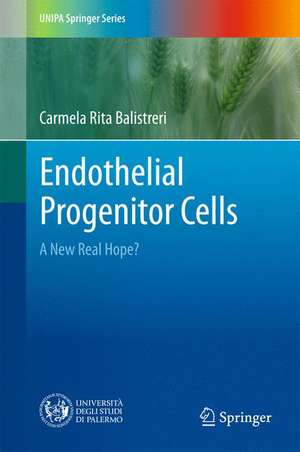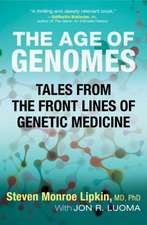Endothelial Progenitor Cells: A New Real Hope?: UNIPA Springer Series
Autor Carmela Rita Balistrerien Limba Engleză Hardback – 6 iun 2017
The book is divided into three chapters, the first of which describes the relevance of translational medicine (TM) as a new research approach to counteract the imposing challengeof age-related diseases. Of the diverse RegMed approaches, particular attention is paid to stem/progenitor cell-based therapies, their benefits and shortcomings, as well as to the description of types of stem and progenitor cells considered for regenerative cell therapies, such as EPCs as emerging candidates for RegMed applications.
In turn, the second chapter outlines the clinical relevance of EPCs as both potential predictors, diagnostic and prognostic biomarkers of age-related diseases and therapeutic agents,discussing their advantages, disadvantages, and conflicting data.
Chapter three proposes a potential roadmap for revising the findings and creating a clearer picture of valid data, which can provide support for various important aspects, i.e.isolating and characterizing EPCs by establishing standardized criteria for EPC research, identifying appropriate sub-populations for cell therapy, timing, dosing, priming of cells,and defining delivery modes for different applications.
The book concludes with an overview of innovative strategies that could improve the efficacy of cell therapy at all levels, including cell priming, bio-nanotechnology, and tissue engineering.
| Toate formatele și edițiile | Preț | Express |
|---|---|---|
| Paperback (1) | 542.58 lei 38-44 zile | |
| Springer International Publishing – 2 aug 2018 | 542.58 lei 38-44 zile | |
| Hardback (1) | 637.13 lei 3-5 săpt. | |
| Springer International Publishing – 6 iun 2017 | 637.13 lei 3-5 săpt. |
Din seria UNIPA Springer Series
- 15%
 Preț: 583.28 lei
Preț: 583.28 lei - 5%
 Preț: 722.48 lei
Preț: 722.48 lei - 15%
 Preț: 653.00 lei
Preț: 653.00 lei -
 Preț: 337.08 lei
Preț: 337.08 lei - 15%
 Preț: 581.14 lei
Preț: 581.14 lei - 15%
 Preț: 640.37 lei
Preț: 640.37 lei - 15%
 Preț: 638.24 lei
Preț: 638.24 lei - 15%
 Preț: 638.89 lei
Preț: 638.89 lei -
 Preț: 386.99 lei
Preț: 386.99 lei - 15%
 Preț: 636.94 lei
Preț: 636.94 lei - 18%
 Preț: 791.09 lei
Preț: 791.09 lei - 20%
 Preț: 448.31 lei
Preț: 448.31 lei -
 Preț: 379.86 lei
Preț: 379.86 lei -
 Preț: 380.25 lei
Preț: 380.25 lei - 24%
 Preț: 734.67 lei
Preț: 734.67 lei - 5%
 Preț: 918.62 lei
Preț: 918.62 lei - 18%
 Preț: 881.71 lei
Preț: 881.71 lei - 15%
 Preț: 638.11 lei
Preț: 638.11 lei - 15%
 Preț: 519.32 lei
Preț: 519.32 lei -
 Preț: 260.77 lei
Preț: 260.77 lei - 15%
 Preț: 642.03 lei
Preț: 642.03 lei - 15%
 Preț: 640.24 lei
Preț: 640.24 lei - 15%
 Preț: 689.97 lei
Preț: 689.97 lei -
 Preț: 379.68 lei
Preț: 379.68 lei - 18%
 Preț: 993.60 lei
Preț: 993.60 lei - 18%
 Preț: 957.13 lei
Preț: 957.13 lei - 18%
 Preț: 724.63 lei
Preț: 724.63 lei - 15%
 Preț: 641.20 lei
Preț: 641.20 lei
Preț: 637.13 lei
Preț vechi: 749.56 lei
-15% Nou
Puncte Express: 956
Preț estimativ în valută:
121.95€ • 132.51$ • 102.51£
121.95€ • 132.51$ • 102.51£
Carte disponibilă
Livrare economică 31 martie-14 aprilie
Preluare comenzi: 021 569.72.76
Specificații
ISBN-13: 9783319551067
ISBN-10: 331955106X
Pagini: 80
Ilustrații: XXII, 80 p. 23 illus.
Dimensiuni: 155 x 235 mm
Greutate: 0.33 kg
Ediția:1st ed. 2017
Editura: Springer International Publishing
Colecția Springer
Seria UNIPA Springer Series
Locul publicării:Cham, Switzerland
ISBN-10: 331955106X
Pagini: 80
Ilustrații: XXII, 80 p. 23 illus.
Dimensiuni: 155 x 235 mm
Greutate: 0.33 kg
Ediția:1st ed. 2017
Editura: Springer International Publishing
Colecția Springer
Seria UNIPA Springer Series
Locul publicării:Cham, Switzerland
Cuprins
Preface.- From the Regenerative Medicine to Endothelial progenitor cells as potential candidates.- Endothelial progenitor cells and their clinical applications as potential disease biomarkers and therapeutic agents: evidence and controversies in their effectiveness.- EPCs: a real hope or an unrealizable dream? Which measures or strategies are necessary for achieving the real hope? Focus on a potential roadmap.
Textul de pe ultima copertă
This book explores the role of endothelial progenitor cells (EPCs) in the context of regenerative medicine (RegMed). In particular, it reveals the value of RegMed as a new TM branch intended to improve the health and quality of life, by restoring, maintaining or enhancing tissue and functions of organs.
The book is divided into three chapters, the first of which describes the relevance of translational medicine (TM) as a new research approach to counteract the imposing challengeof age-related diseases. Of the diverse RegMed approaches, particular attention is paid to stem/progenitor cell-based therapies, their benefits and shortcomings, as well as to the description of types of stem and progenitor cells considered for regenerative cell therapies, such as EPCs as emerging candidates for RegMed applications.
In turn, the second chapter outlines the clinical relevance of EPCs as both potential predictors, diagnostic and prognostic biomarkers of age-related diseases and therapeutic agents,discussing their advantages, disadvantages, and conflicting data.
Chapter three proposes a potential roadmap for revising the findings and creating a clearer picture of valid data, which can provide support for various important aspects, i.e.isolating and characterizing EPCs by establishing standardized criteria for EPC research, identifying appropriate sub-populations for cell therapy, timing, dosing, priming of cells,and defining delivery modes for different applications.
The book concludes with an overview of innovative strategies that could improve the efficacy of cell therapy at all levels, including cell priming, bio-nanotechnology, and tissue engineering.
In turn, the second chapter outlines the clinical relevance of EPCs as both potential predictors, diagnostic and prognostic biomarkers of age-related diseases and therapeutic agents,discussing their advantages, disadvantages, and conflicting data.
Chapter three proposes a potential roadmap for revising the findings and creating a clearer picture of valid data, which can provide support for various important aspects, i.e.isolating and characterizing EPCs by establishing standardized criteria for EPC research, identifying appropriate sub-populations for cell therapy, timing, dosing, priming of cells,and defining delivery modes for different applications.
The book concludes with an overview of innovative strategies that could improve the efficacy of cell therapy at all levels, including cell priming, bio-nanotechnology, and tissue engineering.
Caracteristici
Offers a comprehensive overview of endothelial progenitor cells (EPCs), focusing on their biological functions and applications in translational medicine Discusses EPCs as emerging candidates for new regenerative medicine (RegMed) applications Provides an overview of innovative therapeutic strategies















